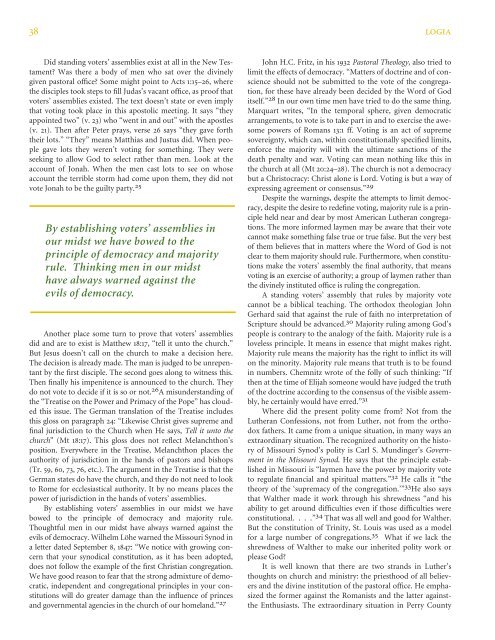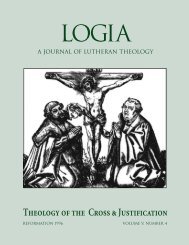03-1 Pastoral Care.pdf
03-1 Pastoral Care.pdf
03-1 Pastoral Care.pdf
- No tags were found...
You also want an ePaper? Increase the reach of your titles
YUMPU automatically turns print PDFs into web optimized ePapers that Google loves.
38 LOGIADid standing voters’ assemblies exist at all in the New Testament?Was there a body of men who sat over the divinelygiven pastoral office? Some might point to Acts 1:15–26, wherethe disciples took steps to fill Judas’s vacant office, as proof thatvoters’ assemblies existed. The text doesn’t state or even implythat voting took place in this apostolic meeting. It says “theyappointed two” (v. 23) who “went in and out” with the apostles(v. 21). Then after Peter prays, verse 26 says “they gave forththeir lots.” “They” means Matthias and Justus did. When peoplegave lots they weren’t voting for something. They wereseeking to allow God to select rather than men. Look at theaccount of Jonah. When the men cast lots to see on whoseaccount the terrible storm had come upon them, they did notvote Jonah to be the guilty party. 25By establishing voters’ assemblies inour midst we have bowed to theprinciple of democracy and majorityrule. Thinking men in our midsthave always warned against theevils of democracy.Another place some turn to prove that voters’ assembliesdid and are to exist is Matthew 18:17, “tell it unto the church.”But Jesus doesn’t call on the church to make a decision here.The decision is already made. The man is judged to be unrepentantby the first disciple. The second goes along to witness this.Then finally his impenitence is announced to the church. Theydo not vote to decide if it is so or not. 26 A misunderstanding ofthe “Treatise on the Power and Primacy of the Pope” has cloudedthis issue. The German translation of the Treatise includesthis gloss on paragraph 24: “Likewise Christ gives supreme andfinal jurisdiction to the Church when He says, Tell it unto thechurch” (Mt 18:17). This gloss does not reflect Melanchthon’sposition. Everywhere in the Treatise, Melanchthon places theauthority of jurisdiction in the hands of pastors and bishops(Tr. 59, 60, 73, 76, etc.). The argument in the Treatise is that theGerman states do have the church, and they do not need to lookto Rome for ecclesiastical authority. It by no means places thepower of jurisdiction in the hands of voters’ assemblies.By establishing voters’ assemblies in our midst we havebowed to the principle of democracy and majority rule.Thoughtful men in our midst have always warned against theevils of democracy. Wilhelm Löhe warned the Missouri Synod ina letter dated September 8, 1847: “We notice with growing concernthat your synodical constitution, as it has been adopted,does not follow the example of the first Christian congregation.We have good reason to fear that the strong admixture of democratic,independent and congregational principles in your constitutionswill do greater damage than the influence of princesand governmental agencies in the church of our homeland.” 27John H.C. Fritz, in his 1932 <strong>Pastoral</strong> Theology, also tried tolimit the effects of democracy. “Matters of doctrine and of conscienceshould not be submitted to the vote of the congregation,for these have already been decided by the Word of Goditself.” 28 In our own time men have tried to do the same thing.Marquart writes, “In the temporal sphere, given democraticarrangements, to vote is to take part in and to exercise the awesomepowers of Romans 13:1 ff. Voting is an act of supremesovereignty, which can, within constitutionally specified limits,enforce the majority will with the ultimate sanctions of thedeath penalty and war. Voting can mean nothing like this inthe church at all (Mt 20:24–28). The church is not a democracybut a Christocracy: Christ alone is Lord. Voting is but a way ofexpressing agreement or consensus.” 29Despite the warnings, despite the attempts to limit democracy,despite the desire to redefine voting, majority rule is a principleheld near and dear by most American Lutheran congregations.The more informed laymen may be aware that their votecannot make something false true or true false. But the very bestof them believes that in matters where the Word of God is notclear to them majority should rule. Furthermore, when constitutionsmake the voters’ assembly the final authority, that meansvoting is an exercise of authority; a group of laymen rather thanthe divinely instituted office is ruling the congregation.A standing voters’ assembly that rules by majority votecannot be a biblical teaching. The orthodox theologian JohnGerhard said that against the rule of faith no interpretation ofScripture should be advanced. 30 Majority ruling among God’speople is contrary to the analogy of the faith. Majority rule is aloveless principle. It means in essence that might makes right.Majority rule means the majority has the right to inflict its willon the minority. Majority rule means that truth is to be foundin numbers. Chemnitz wrote of the folly of such thinking: “Ifthen at the time of Elijah someone would have judged the truthof the doctrine according to the consensus of the visible assembly,he certainly would have erred.” 31Where did the present polity come from? Not from theLutheran Confessions, not from Luther, not from the orthodoxfathers. It came from a unique situation, in many ways anextraordinary situation. The recognized authority on the historyof Missouri Synod’s polity is Carl S. Mundinger’s Governmentin the Missouri Synod. He says that the principle establishedin Missouri is “laymen have the power by majority voteto regulate financial and spiritual matters.” 32 He calls it “thetheory of the ‘supremacy of the congregation.’” 33 He also saysthat Walther made it work through his shrewdness “and hisability to get around difficulties even if those difficulties wereconstitutional. . . .” 34 That was all well and good for Walther.But the constitution of Trinity, St. Louis was used as a modelfor a large number of congregations. 35 What if we lack theshrewdness of Walther to make our inherited polity work orplease God?It is well known that there are two strands in Luther’sthoughts on church and ministry: the priesthood of all believersand the divine institution of the pastoral office. He emphasizedthe former against the Romanists and the latter againsttheEnthusiasts. The extraordinary situation in Perry County
















